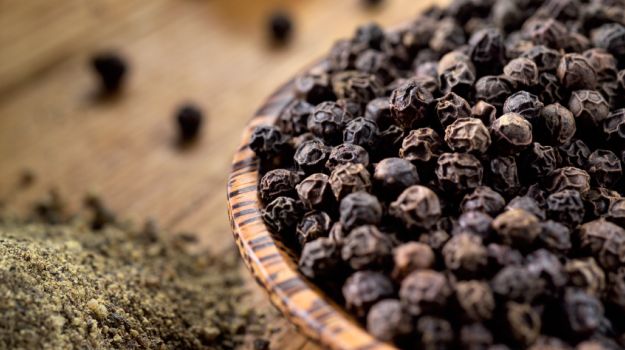Black Pepper Essential Oil has a warm, dry and spicy character that is fresh and inviting. It also has a woody and gently musky aroma.
Black pepper oil is good for warming, energizing and stimulating the mind and body. It also has a calming and grounding effect that fortifies the nervous system, boosting both alertness and stamina.
Black pepper essential oil comes from the fruit of black pepper, Piper nigrum. This plant, which grows natively in south India, grows as a vine on trees or poles. Black pepper plants can reach thirteen feet in height.
Black, White, Rose And Green Pepper All Come From The Fruit of The Black Pepper Plant
The black and the green types of pepper come from unripe fruits. White pepper production uses ripe fruits. Steam distillation is the usual method of producing the oil.
Uses of Black Pepper Essential Oil for the Mind
Black pepper essential oil has an energizing effect on the mind so avoid using before going to bed. At the same time, it can reduce the sense of anxiety.
The essential oil of black pepper is often used by people who want to quit smoking. Its anti-anxiety effect can reduce cravings, as will the sense of warmth it produces.
Black Pepper Essential Oil Helps Relieve Stress Caused By:
- Emotional blocks
- Anger and frustration
- Mental fatigue and indecision
Blend Black Pepper Essential Oil With Other Essential Oils for Additional Feelings of Stress:
- Palmaroa and Pine: Stress caused by changing circumstances
- Orange and Grapefruit: Emotional Blocks. A chronic build up of stress
- Neroli and Melissa: Indifference. Sudden sensitivity and anxiousness
- Mandarin and Lemon: Anger from past trauma and sadness
Uses of Black Pepper Essential Oil for the Body
Black pepper essential oil has many medicinal properties. Black pepper acts as a stimulant for the digestive system, promoting the secretion of all the juices necessary for digestion. It also prevents excess gas formation due to its anti-bacterial effect. It can also act as a slight purgative.
Black pepper essential oil acts as a diuretic and diaphoretic. It increases urination and sweating, aiding the removal of toxins.
The antioxidant properties of the essential oil of black pepper are well documented. It can help combat the damage created by free radicals, especially the damage that comes with aging.
When applied to the skin, black pepper oil has a warming effect. It stimulates circulation, offering a relief to people suffering from arthritis and rheumatism.
Black Pepper in Ancient History
Black pepper played an important role across different cultures for centuries. In ancient Egypt, mummification rituals utilized black pepper. Archaeologists found it in the nostrils of the pharaoh Ramses the Great.
In the Roman Empire, Roman citizens coveted black pepper spice. Even though it was less expensive than white pepper, it was still considered to be the pleasure of the rich. Many of the dishes in Roman cookbooks required the use of pepper.
Black Pepper in Modern History
Pepper remained a prized commodity well into Middle Ages, and saw use as currency or as collateral. It was still too expensive for regular people to use when cooking. As black pepper importation in Europe rose, its prices fell greatly.
By the early nineteenth century, pepper was a common commodity in American stores. Due to the high demand of black pepper, unscrupulous people went so far as to counterfeit it.
Friedrick Accum, a German chemist, described in his 1820 Treatise on Adulteration of Food the methods of counterfeiting pepper:
“The spurious pepper is made up of oil cakes (the residue of lintseed, from which the oil has been pressed,) common clay, and a portion of Cayenne pepper, formed in a mass, and granulated by being first pressed through a sieve, and then rolled in a cask.”
Experts noted black pepper for its benefits to the gastric system. The Grocer’s Goods: A Family Guide, an early consumer guide written by Frederick Bartlett Goddard and published in 1888, has this to say about pepper:
“Pepper is an agreeable addition to many kinds of food, and is said to promote the secretion of the gastric juice; it is more used than any other spice.”
In the second volume of A System of Practical Medicine, published in 1885, William Pepper also speaks of the beneficial effects of pepper:
“Condiments with the food directly stimulate the action of the enfeebled stomach. The old remedy of mustard-seed is not unfrequently useful, and pepper, cayenne, horseradish, and curries act in a similar manner in torpid digestion.“
Black Pepper Essential Oil Cautions:
When used with an essential oil dispenser, black pepper essential oil can increase the blood pressure slightly. It can irritate the skin if not diluted properly, and it can over-stimulate the kidneys.
Pregnant and nursing women should avoid black pepper essential oil.



